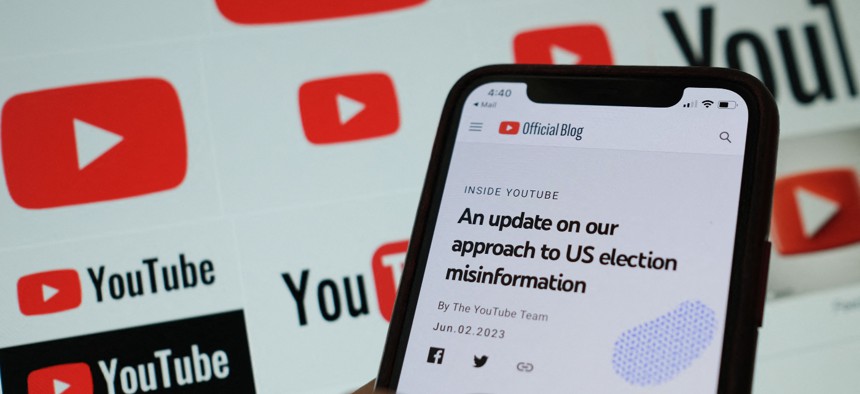Democrats call YouTube ‘extremely irresponsible’ for election misinformation rollback

CHRIS DELMAS/AFP via Getty Images
YouTube’s decision to stop removing false content about previous U.S. elections “threatens to weaken our democracy,” several top Democrats on the House Energy and Commerce Committee said in a letter to the platform’s leaders.
Leading Democrats on the House Energy and Commerce Committee wrote to the CEOs of YouTube and parent company Alphabet on Thursday to criticize the video platform’s decision to roll back its election misinformation policy and allow false claims about previous U.S. elections to appear on the site ahead of the 2024 presidential election.
YouTube announced in a June 2 blog post that it would “stop removing content that advances false claims that widespread fraud, errors or glitches occurred in the 2020 and other past U.S. presidential elections.”
“The ability to openly debate political ideas, even those that are controversial or based on disproven assumptions, is core to a functioning democratic society — especially in the midst of election season,” YouTube said at the time.
The congressional letter — from House Energy and Commerce Committee Ranking Member Frank Pallone, D-N.J.; Subcommittee on Innovation, Data and Commerce Ranking Member Jan Schakowsky, D-Ill.; Subcommittee on Communications and Technology Ranking Member Doris Matsui, D-Calif.; and Subcommittee on Oversight and Investigations Ranking Member Kathy Castor, D-Fla. — said YouTube’s policy change was “extremely irresponsible” and “threatens to weaken our democracy.”
“We are firm believers in the First Amendment and respect a social media platform’s desire to foster a fulsome discussion of political ideas and thoughts,” the four lawmakers wrote. “However, false content that questions the legitimacy of a presidential election has already caused real-world harms to election workers, law enforcement and elected officials, among others.”
The Democrats wrote that any decision that allows online users the opportunity to “offer a repeatedly disproven narrative about a presidential election — or any election — should be taken with the utmost caution and consideration,” especially given the fact that “the 2024 presidential election cycle will likely feature several of the same misinformation tactics that we saw in the 2020 presidential election.”
Pallone, Schakowsky, Matsui and Castor requested that YouTube provide further information to their offices by July 6 detailing its rationale for the policy change, how it plans “to fact check, label, provide context around or reduce the spread of such content on its platform” and its planned misinformation policy for the 2024 presidential election — including any steps it will take “to address content containing election misinformation for the 2024 presidential election cycle that also contains election misinformation surrounding the 2020 presidential election.”






